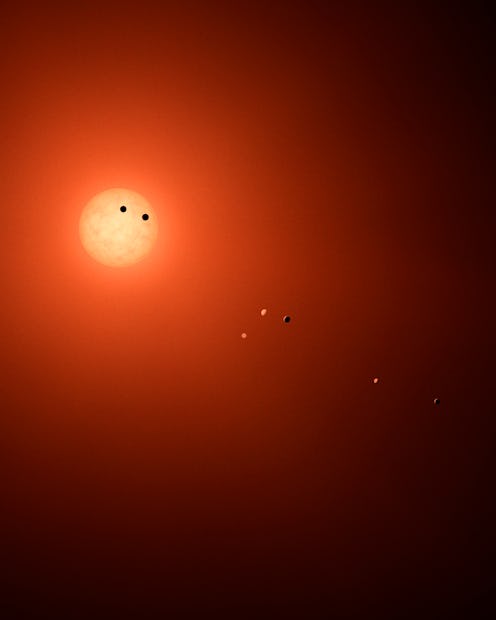
You guys ready for this hot celestial take? The Moon gets all the freaking credit. Honestly. It's like, hello, there are other things in the sky! Plenty of 'em! Planets! Stars! Comets! Space trash! A great example? Mercury. It's dope. The best time to see Mercury in 2017 is on May 17, so break out those telescopes. It's time to get intimate with this planet.
Mercury, despite catching the world afire every time it turns retrograde, is actually not "King of the Planets." That honor belongs to Jupiter, the largest planet in our solar system, which glows bright and clear during dusk in the southeast part of the sky during the early summer months. Mars, on the other hand, is dimmer, lower, and in the west-northwest corner. Venus? She's basking in that pre-sunrise glow, facing east. But what about Mercury, the Messenger of the Gods, the Planet of Communication? Well, he stays low to the horizon, and lets off very little light. It takes a clear shot and a good pair of binoculars (or a telescope) to catch a glimpse of the Sun's closest neighbor most of the year.
On May 17, however, Mercury will be at its greatest Western elongation, which means it will be as far west from the Sun that it will be all year, and reach the highest point above the horizon. This is the day to see Mercury. Next Wednesday, there's nothing lacking from this "inferior" planet.
No one puts Mercury in a corner! Except, like, you know, the orbital patterns of our solar system. But whatever.
Yes, certain planets are referred to as "inferior," specifically Mercury and Venus, as their orbits are closer to the Sun than the Earth's. Astronomists are vicious, huh?
Anyway, there will be nothing lacking from Mercury if you have some sort of ocular aid. Sorry, guys, no matter where you are, no matter how clear the sky or unimpeded your view, there's a good chance you'll need some help. Space.com suggests scanning the horizon with binoculars about 15 degrees north of due east in the hour before sunrise, particularly if you live in one of the more Northern states. For you Southerners, there's the possibility of catching that bright planet just above the horizon with your own eyes.
If you do manage to catch sight of Mercury, say "Hey," and ask how the living conditions are, won't you? Can't be much worse than the Earth right now. Right?